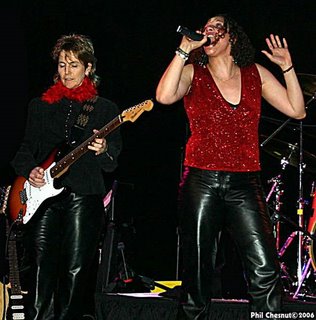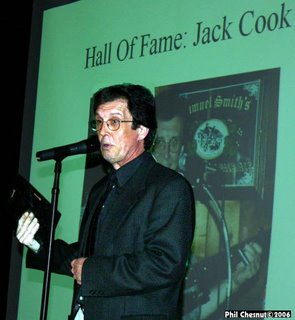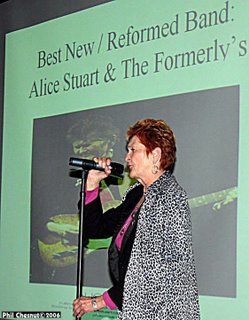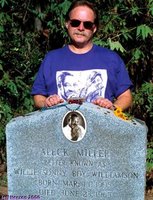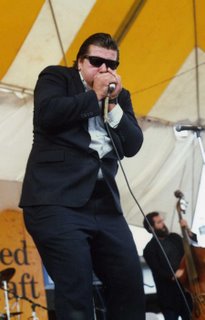Pat “Guitar Slim” Chase – Onetime Seattle BluesmanBy Mark Dalton
I’ll never forget the night I first met
Pat “Guitar Slim” Chase – he called me out of the blue sometime in 1987, introduced himself on the phone, and said he’d stopped by the Backstage in Ballard to see
Charlie Musselwhite a couple weeks before. I was on the gig that weekend, along with a guitar player Charlie had brought with him from California. Pat had recently moved up here from the Golden State himself, and he had a gig, backing an Elvis impersonator at this joint in Issaquah called Fasano’s. Fasano’s was a mom and pop Italian restaurant in “downtown”
Issaquah, right on Front street, with a red-and-black naugahyde-upholstered lounge in the back. I said sure, I was up for it, even though I had no idea what I was getting into, the scene sounded weird enough that I wanted to check it out! I got to Fasano’s and wheeled my amp into the back room, and the first person I ran into was “Rockin’ Rick” Hirskanen, a giant guy with a shaved head and a devilish goatee, draped in a flashy tailored suit with pointy Italian shoes on his feet. Setting up his drums. I don’t know why it took me so long to actually meet Rockin’ Rick – we’d both been playing around town for years, and he looked familiar; whatever, we became instant friends. Then came Pat, in shorts and a T-shirt, hauling in vintage
Fender Twin, unpacking a couple of
Strats (one black and one creamy lavender with a mother of pearl pickguard) and an ancient
parlor guitar, looked like from the 30’s, with a D'Armond pickup clipped in the hole. Hung them all on a little guitar tree, and then went out to change from Pat Chase into Guitar Slim.
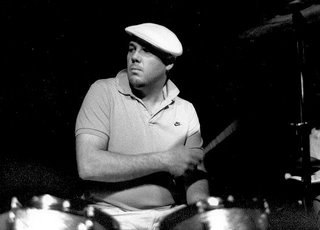
Rockin' Rick - RIP. Photo by Ronda Lee
If Rockin’ Rick was a sharp dressed man, and he certainly was, he sure met his match in Guitar Slim. As I recall his outfit that night it was some kind of weird satin tux, if not from Mr. Mac’s in Tacoma (both Pat and Rick haunted that fine men’s clothing store), then it was from some East Bay haberdashery with threads of similar taste – ribbon stripe down the side of the pants, skinny metallic tie and white patent leather shoes to top off the effect.
“Elvis” was a good enough guy, totally into his role (this was a Las Vegas vintage Elvis), and he only did four or five tunes a set. His tunes were familiar and fun to play, and the rest of the night was the blues. I was immediately taken with Slim’s playing – great straight ahead, Chicago style blues, and fine slide guitar on that old box. Rick played solid, no-frill drums, and the whole night was a kick. “Let’s do this again,” we agreed, and that’s how a more-often-than-not partnership lasting a dozen years began.
So where did Pat “Guitar Slim” Chase come from? What was his story before he landed in Seattle? Pat came to us after many years on the road with Mark Hummel and the Blues Survivors, playing from one end of this country to the other, and elsewhere in the world too. He came out of the bustling Bay Area beach/blues scene centered around (and celebrated by Freddy King in the classic beach/blues instrumental tune of the same name) San Jose. The same rich scene that spawned other great Bay Area bluesmen such as Chris Cain, and our own transplanted sax man, Dennis Ellis (more about him later). During his four years in the Navy, Pat played music literally around the world, and it was during an extended posting at the Great Lakes Naval Base that he jumped into the Chicago Blues scene, eventually serving a lengthy apprenticeship with the legendary pianist, Sunnyland Slim, and becoming acquainted with the Seattle native, blues singer, drummer and recording studio owner, Twist Turner and seemingly everybody else playing the blues in the nation’s second city. Over the years Pat also played with the William Clarke band, and toured with George “Harmonica” Smith and Philip Walker, among others.
Now, tired of the road, and a bit tired of being a sideman, Pat came up to Seattle to visit his brother Jeff, liked what he saw (and heard) here, and decided to stick around. For the first year or so, the gigs I did with Pat were a mixed bag - always fun musically, but in some odd places. Pat would basically just hop in his pickup truck and stop at any place that looked even remotely like a band might be needed, and if they’d pay us, we’d play. Places like the Moose Lodge in North Bend, of the Snoqualmie Eagles, or the Bel-Red Elks Club, where we had to stop every night at 11pm for the tolling of the bell for all the Elks passed on. We also played black clubs like Deano’s on Madison, or the Turning Point out on Rainier, Rose Petals, way south on Martin Luther King Way (where we recorded Guitar Slim’s second CD, live) … places where blues fans originally from the deep south, now in late middle age, still come out in their best clothes to dance and drink and make the night an EVENT for all concerned.
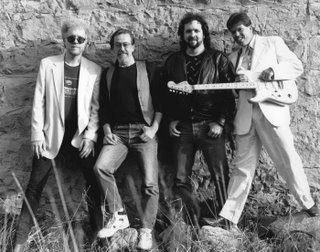 The Pat Chase Band.
The Pat Chase Band.
Left to right: Mark Dalton, Larry Harris, Dennis Ellis, and Pat Chase.
We got to be a kind of house band at Deano’s for awhile – even playing the blues for their Mother’s Day Brunch one year, which we considered a distinct honor. Many people turned out for this event, the food was excellent and the humble music room with its cracked linoleum floor was all decked out with flowers and crepe paper. Deano’s may be a public nuisance to the Mayor and the police, but we played there often enough and long enough to see what it really was: a community center; a last vestige of the Central District’s once thriving black culture; a place where everyone from the neighborhood was welcome to get mellow, stretch out, be themselves, and enjoy each other, white bluesmen included. Pat Chase is possibly the least racially conscious musician of any color that I ever worked with. He was neither intimidated by, nor did he worship black people or black musicians; he just looked everybody in the eye and treated them all like people… as long as they could play. My wife Katha’s assessment of him was simple; “Music is Pat’s first language – English is second.”
We’d been banging around Seattle for awhile, me and Pat and a variety of drummers, including a black guy named Leon (photo of him on this webpage) who was left-handed (making an entire band of left hand men), and who loved playing the old time country music that was featured as a kind of alter-ego we could project up thar in them hills (Hank Sr., Lefty, Waylon and Willie). After a short jaunt back on the road with Hummel, Pat came back to town with a woman named Linda who he met in Calgary. She’d been around show business for awhile and wanted to take a crack at booking this band. I liked her right away. She was smart, read good books, had a dry sense of humor, and she was relentless and tough when dealing with club owners, in a way that almost all musicians find very difficult.
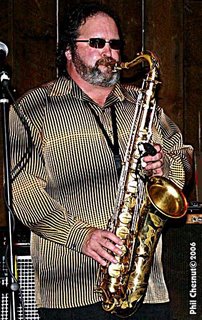 At around this same time, sax player Dennis Ellis (left -photo by Phil Chesnut), a youthful buddy from the San Jose scene, started playing with the band; and, with the addition of the inimitable Larry Harris on the drums, the initial nucleus of the “Guitar Slim Band” for the next decade was assembled. In terms of sustained work, this was far and away the most successful band I was ever in – and that includes Mike Lynch’s “Bluestars” band, with Leslie “Stardrums” Milton and Jeff Ziontz, which was also a very busy, highly successful band at its peak.
At around this same time, sax player Dennis Ellis (left -photo by Phil Chesnut), a youthful buddy from the San Jose scene, started playing with the band; and, with the addition of the inimitable Larry Harris on the drums, the initial nucleus of the “Guitar Slim Band” for the next decade was assembled. In terms of sustained work, this was far and away the most successful band I was ever in – and that includes Mike Lynch’s “Bluestars” band, with Leslie “Stardrums” Milton and Jeff Ziontz, which was also a very busy, highly successful band at its peak.
Just as an example, here’s an excerpt from an actual Guitar Slim spring schedule from the mid-90’s:
May 21st, Fri – Edmonds Waterfront Festival (early)
May 21st, Fri – Central Tavern
May 22nd, Sat - Redhook Brewery
May 23rd, Sun, Fabulous Mr. Blues Club with Korla Wygal (Does anyone remember this short-lived club on Second Avenue?)
May 28/29 - The New Orleans
May 30th, Sun – Folklife
May 31st, Mon – Pike Market Festival
June 4th, Fri – Prositos in Tacoma with guests Korla Wygal and Michael Powers
June 5th, Sat – Harbor Club Blues Festival (early)
June 5th, Sat – Prositos with guest Korla Wygal
June 6th, Sun – Pioneer Square Fire Festival (early)
June 6th, Sun - Seattle Swing Dance Club
Linda would not rest until we were booked every possible weekend minute, and holiday weekends were her favorites. One Fourth of July (just for that one day), she had us booked for four different gigs, in four different cities – the first three were one hour festival sets, the last a regular club gig to round out our day – we made them all, running all the way, and by the end of the day, we were smoking – playing out there in the stratosphere. We were so busy for so many years that the tunes took on a life of their own. We never, ever rehearsed with this band – we would learn new songs out in the truck, minutes before show time, and if they worked, they were simply added to Pat’s huge repertoire. We never had set lists. Pat would just call them off as soon as the last tune was done, always just by key and a count. He didn’t remember (if he ever knew) the names of many of the tunes we did, and we didn’t either. Songs took on complicated arrangements over time, just because bits and pieces that were thrown in over time stuck here and there and became part of our version of the tune. We were still young, we had energy, we had fun and we made money.
One night we were playing at a big log cabin type biker bar way up in the hills, down south around Mt. Rainier, and the place was surrounded by Harleys and packed with hard drinking revelers all night long. At the end of the evening, Pat went over to the burly barkeep to get paid. There was an animated conversation and a few minutes later Pat came over to us and said “he’s trying to screw us on the money! He claims he can only pay us $350, and the deal was $500, right?” Linda shook her head, and, with a tight smile, she said, “You boys just wait outside by the truck. I’ll get the money.” We dutifully filed out of the club. A few minutes later Linda came out, walking fast, with the same tight smile and a fistful of money fanned out in her hand, saying, "and here it is!” We never did know, and we decided we didn’t want to know what Linda had done to that poor schmuck to get our cash (and her 10%) so quickly. Whatever it was, after that night, nothing much Linda did would surprise any of us again.
Like all great, ruthless band managers, Linda made a few enemies here and there. I’m reading the autobiography of the Rolling Stones’ manager, stylist, attitude coach and producer, Andrew Loog Oldham, and there are definite similarities in style and approach between the two. Linda had little patience for those she regarded as fools, and she was not afraid to use anger and intimidation as tools to get what she and the band needed. Some of the people she rubbed the wrong way at the time were members of the Washington Blues Society (WBS), and whether or not they deserved her wrath, the result was that the Guitar Slim Band never got the support of this organization. As a founding WBS member and 1992 BB winner, I was a little unhappy about this. One year in the later 90’s after the band was totally shut out of the awards once again, at a time when our CD sales were in the thousands (strictly off the stage), we were playing virtually all the music festivals in the state, including multiple appearances at the Bite of Seattle, Bumbershoot, Folklife, Port Townsend (six years in a row) and the Waterfront Blues Festival in Portland, when we had been in the daily papers all over the state, interviewed in numerous local music rags, on television, etc., etc., I paid money to put an ad in the Bluesletter saying “thanks to all of our thousands of fans out there for coming out to see us play every weekend” (in spite of the fact that the WBS refused to acknowledge our existence!)
Of course, popularity is no guarantee that a band is any good, as witness any top 40 chart, any month of any year! But the fact is that the Guitar Slim Band was good, in all the ways that it is important for a Blues band to be good. Pat’s homely voice certainly wouldn’t win him a spot on American Idol, but he used it to maximum advantage to put his tunes across, and, on both regular and slide guitar, he was one of the best. On a good night, I’ve heard Pat play blues that was as deep and soul wrenching as early Buddy Guy, and he always held his own with anyone else on the stage, whether it was Too Slim, Chris Cain, or Susan Tedeschi, Sonny Rhodes, Luther Tucker, PeeWee Crayton or John Lee Hooker. We had already seen the results of ballot box stuffing early on in the history of the WBS (déjà vu all over again lately, eh?), and now it seemed clear that the BBs were continuing to be primarily an insider’s popularity contest for bands that buddied up to the right board members. Didn’t make any perceptible difference in our bookings, just kind of sad that the quality of the music had so little to do with the awards.
On the other hand, here’s what Rick Hall had to say about our first CD, in the Cascade Blues Association’s “Bluesnotes:”
“Top notch group of musicians… standout soulful horn work… Guitar Slim’s chops are first rate and his slide work is very sharp indeed… infectious in style with stingin’ guitar licks and good vocals… This is a fine blues album, and I do recommend it.”
Strange, huh? Living Blues Magazine had much the same thing to say, with special praise for Dennis’ sax playing.
In fact, the presence of Dennis Ellis in the band lent the group a lot of additional weight as a fine, straight ahead, nothing-but-the-Blues band. I have nominated Dennis for a “best horn” BB every chance I’ve had for the last 20 years, as of yet to no avail. A former member of the Chris Cain Band and other Bay Area aggregations before relocating permanently to the Northwest, Ellis blows a sax that is straight out of the mid-50’s honkers and shouters era. Flat-footed, straight-ahead, hard blowing R&B sax. Dripping with soul. His singing was (and is) great too – mellow, laid back, ironic blues with an old school hipster’s frame of reference. His choice of material is impeccable, as you can hear on the Crossroads Band CD.
It is ironic, perhaps, that it is only lately, with the latter-day Crossroads Band, that Dennis is beginning to receive the recognition from the WBS that he has richly deserved for the past 20 years as one of the hardest working of our great local horn men. ‘Bout time, I’ll say it again.
A word about drummers. Pat was tough on drummers. Tough and fussy. He hated shuffles that leaned on a hi-hat. He would tell drummers to “leave the damned hi-hat at home,” and “stay on the ride cymbal” for shuffles… sometimes provoking a perplexed response, sometimes frustration and pushback. Some of his wrangles with drummers, in fact, onstage and off, have passed into legend – those band stories that get told on breaks, and passed on from musician to musician for years. Joe Guzman, a great drummer from a famous Yakima Valley music family, played with the band for a year or so, and when Pat annoyed him too much, Joe would spend the next several gigs going “Ouch!” or “Whoa!” or “Hey!” every single time Pat would fluff a note – which, some nights, happened fairly frequently as Pat would be pushing himself into new territory. After awhile, the two of them would declare an uneasy truce, leaving me, the bass player, to musically mediate between them onstage like some kind of Henry Kissinger of the Blues.
KT (Kirk Tuttle) played with the band a lot, and was our steady drummer for the last couple of years of the band’s long run. Chris Leighton played with us often at different times, always a real treat for me, as was Les Merrihew, who was on drums at the Snoqualmie Eagles one night when a succession of ironic country weepers had us laughing so hard onstage that I was doubled up over my bass and he was almost falling off his drum stool. Andrew Cloutier (now with Left Hand Smoke) played with us a number of times, and I really liked his lazy, behind-the-beat shuffle. Perfect for in-the-pocket bass playing, and if I ever put together the all-Jimmy Reed tribute band that has been my dream since high school (four guitars, all doing the different, patented Jimmy Reed components of his band in its heyday, plus bass and drums), Andrew will be the man!
But probably the greatest drummer we worked with in the context of Guitar Slim was the late Larry Harris. Like our stellar local tenor man Ron Ussery, Harris was a graduate of the demanding Las Vegas/Reno/Tahoe School of Music of the late 50’s/early 60’s. He saw Sam Butera and the Witnesses “pants” Sammy Davis Jr. onstage in the Desert Inn lounge one night, and plenty of other craziness from Louis Prima and his manic partners, and the other 24 hour a day musicians of that era. Harris knew all the different kinds of shuffles, and an incredible variety of thundering turnarounds. His childhood heroes were Gene Krupa, and the drummer for Little Richard’s band (studio ace Earl Palmer, who he got to see live on several occasions growing up). Larry was also part of the Market scene, playing regularly in the area, first with Wayne Marshall’s band in a long house band gig at the Caballero, later with the Johansson Brothers band and then with Joe and Little Bill for part of their infamous years-long stint at the Mint. Playing with Larry when he was in his prime, as I did when he was in the old Brian Butler Band with Kim Field, as well as the early years of the Guitar Slim band, was for me, as a bass player, at times a little like being chased down the tracks by a very large steam engine, running full blast, nudging my heels. This man had soul, and he had power behind that drum set. Larry’s wife Judy was also one of the great characters on the local music scene, a wacky, pint sized woman with an awesome capacity for alcohol.
The best story I have about blues and soul singer Korla Wygal, who used our band for backup regularly for several years, was an outdoor “Taste of Tacoma” gig on a grassy hillside where Korla, with her wireless mike, walked through the entire crowd, singing, and stopping to kiss every bald-headed man in the crowd on the top of his head – except the ones who ran away when they figured out what she was doing!
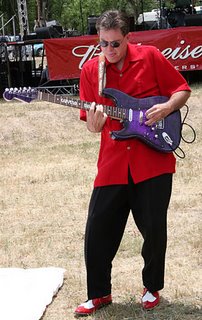 As good things often do in the Blues World, however, this good thing came to an end in Y2K. The marital and musical partnership of Pat (left - this photo is from Pat's current web page, the photographer is not credited) and Linda came sadly unraveled, and Pat left town, first for New Mexico, now in El Paso, still playing, doing very well thank you; and the rest of the band, not wanting to quit, went out and rounded up one David Hastings Conant to form the Crossroads Band. Dennis and Dave hit it off immediately, and they made some truly great music together, both before and after the addition of multi-talented Steve Bailey. But it was, again, music that many members of the WBS did not hear live until the WBS-sponsored Blues Walk, very near the end of both Dave and Isaac Scott’s lives, because they simply never came out to see us over the 18 months that Dave was a part of the Crossroads Band.
As good things often do in the Blues World, however, this good thing came to an end in Y2K. The marital and musical partnership of Pat (left - this photo is from Pat's current web page, the photographer is not credited) and Linda came sadly unraveled, and Pat left town, first for New Mexico, now in El Paso, still playing, doing very well thank you; and the rest of the band, not wanting to quit, went out and rounded up one David Hastings Conant to form the Crossroads Band. Dennis and Dave hit it off immediately, and they made some truly great music together, both before and after the addition of multi-talented Steve Bailey. But it was, again, music that many members of the WBS did not hear live until the WBS-sponsored Blues Walk, very near the end of both Dave and Isaac Scott’s lives, because they simply never came out to see us over the 18 months that Dave was a part of the Crossroads Band.
As for Guitar Slim, the important record of his tenure in Seattle is in the memories of the thousands of people who did come to see us over those dozen years. People still come up to me regularly with, “Didn’t you play with Guitar Slim? I remember one day down on the Pier when I saw you guys, and your guitar player was just standing out in the middle of Alaskan Way, playing his song! We thought sure he was gonna get run over by a truck or something!”
There are hundreds of stories. You just had to be there, folks.
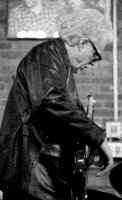 Originally from Nebraska, Mark Dalton moved to Seattle in the early '70s. He is an accomplished bassist and stalwart bluesman. He currently plays with the Chris Stevens Band. Photo by Ronda Lee.
Originally from Nebraska, Mark Dalton moved to Seattle in the early '70s. He is an accomplished bassist and stalwart bluesman. He currently plays with the Chris Stevens Band. Photo by Ronda Lee.


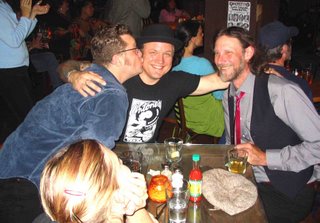








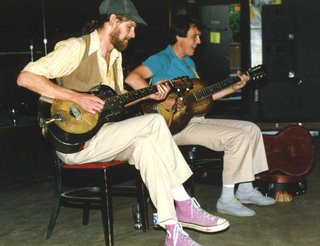






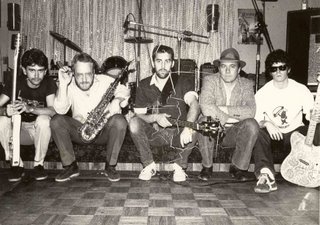
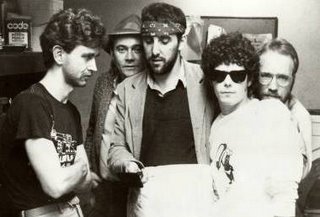
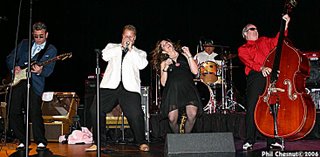
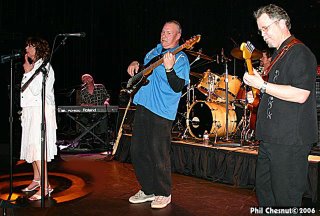 Blues Alliance
Blues Alliance